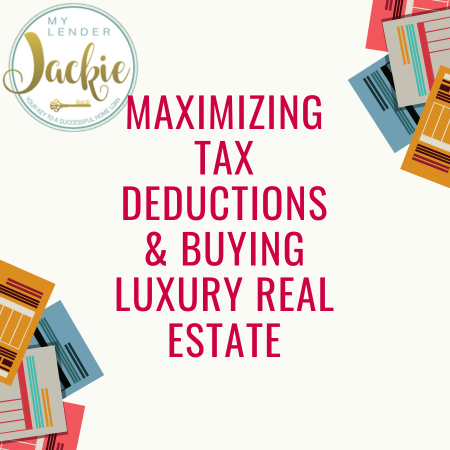One of the best benefits available to you as a successful self-employed person can also become a major hurdle when you want to buy a home; we’re talking about tax deductions. If you’re self-employed, you probably take advantage of tax deductions to minimize your taxable income. While this is great for saving money on taxes, it can be a major roadblock when trying to qualify for a mortgage—especially for high-end or luxury real estate.
Traditional mortgage lenders use your tax returns to determine your qualified income, and if your tax deductions make it look like you earn significantly less than you actually do, securing financing can become quite a challenge. The great news is, we specialize in helping self-employed borrowers reach their real estate goals.
 Why Lenders Might Turn You Down
Why Lenders Might Turn You Down
Most lenders require at least two years of tax returns to verify your income. If you’re self-employed, they look at your net income—the amount left over after tax deductions—not your gross revenue. If you’ve written off significant business expenses (as many entrepreneurs and business owners do), your taxable income may look much lower than what you actually bring in.
This can be frustrating when you know you can afford a luxury home but don’t technically “qualify” under traditional lending guidelines.
Alternative Options to Qualify
If we’re describing a challenge you can relate to, you need to work with a lender that understands. We have spent years developing our expertise in helping self-employed borrowers find the financing that works for them. These are some of the alternative options we offer that can uniquely benefit borrowers in your shoes:
- Bank Statement Loans: Instead of tax returns, bank statement loans allow you to qualify based on the income reflected in your bank deposits. We typically review 12 to 24 months of bank statements to determine your average monthly income. This a great option for self-employed individuals with high cash flow but low reported taxable income.
- DSCR Loans: If you’re purchasing a luxury home as an investment property, you might qualify for a DSCR loan, which bases approval on the property’s potential rental income rather than your personal income.
- Stated Income Loans: The approval process for these loans focuses on your financial strength, credit score, and down payment rather than requiring extensive income documentation.
- Non-QM Loans: Non-QM loans are designed for borrowers who don’t meet the strict guidelines of conventional mortgages. These loans often use alternative income documentation, such as profit-and-loss statements, 1099 income, or even business revenue, to determine your ability to repay the loan.
Strengthening Your Mortgage Application without a W-2 and Tax Deductions
If you’re planning to apply for a mortgage without a W-2, there are some things you can do to strengthen your application. The process of approval is going to be different from qualifying based on your tax returns, so here’s what you need to do to be prepared:
- Save a larger down payment. Having 20%-30% saved for a down payment can make approval easier to achieve.
- Improve your credit score. Most loan options still require a strong credit score, so make sure yours is as high as it can be (ideally above 700) before you apply.
- Get personalized advice from a loan officer who understands. Not all lenders understand the complexities of self-employed income, so working with a team like ours is a game-changer.
Just because your tax returns show a lower income than you actually earn doesn’t mean you can’t qualify for a mortgage on a luxury home. If you’re struggling to get approved the traditional way, contact us to find out how we can help you reach your goals.

 Why Lenders Might Turn You Down
Why Lenders Might Turn You Down